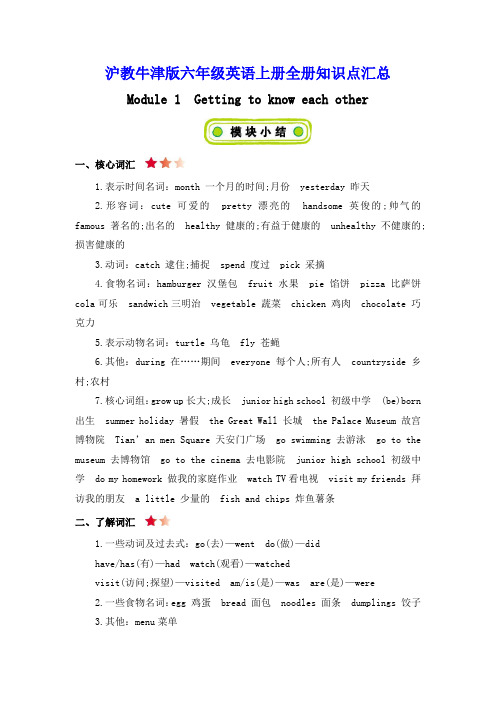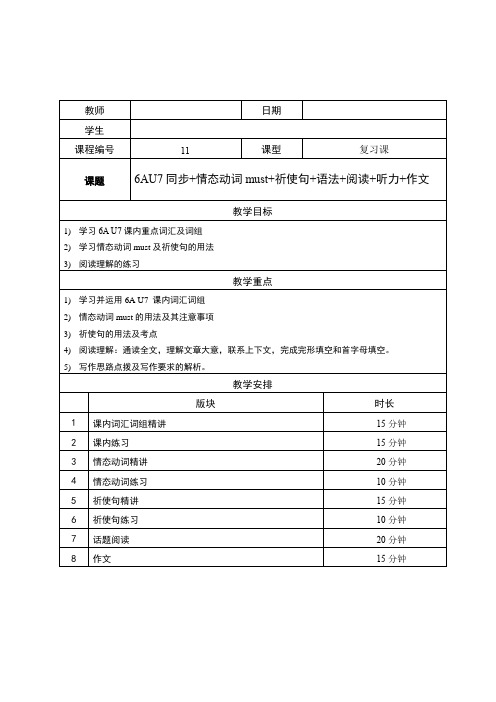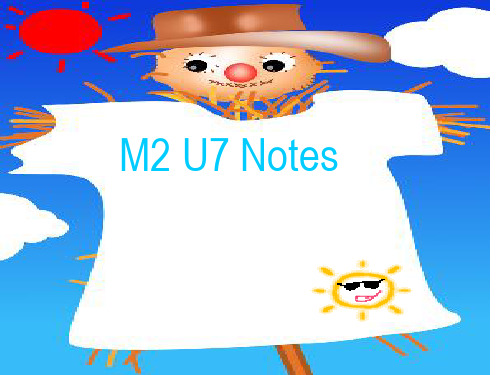牛津版英语六年级上—情态动词&祈使句—话题阅读(健康饮食)—听力U12
- 格式:docx
- 大小:189.42 KB
- 文档页数:19

沪教牛津版六年级英语上册全册知识点汇总Module 1 Getting to know each other一、核心词汇1.表示时间名词:month 一个月的时间;月份yesterday 昨天2.形容词:cute 可爱的pretty 漂亮的handsome 英俊的;帅气的famous 著名的;出名的healthy 健康的;有益于健康的unhealthy 不健康的;损害健康的3.动词:catch 逮住;捕捉spend 度过pick 采摘4.食物名词:hamburger 汉堡包fruit 水果pie 馅饼pizza 比萨饼cola可乐sandwich三明治vegetable 蔬菜chicken 鸡肉chocolate 巧克力5.表示动物名词:turtle 乌龟fly 苍蝇6.其他:during 在……期间everyone 每个人;所有人countryside 乡村;农村7.核心词组:grow up长大;成长junior high school 初级中学(be)born 出生summer holiday 暑假the Great Wall 长城the Palace Museum 故宫博物院Tian’an men Square 天安门广场go swimming 去游泳go to the museum 去博物馆go to the cinema 去电影院junior high school 初级中学do my homework 做我的家庭作业watch TV看电视visit my friends 拜访我的朋友 a little 少量的fish and chips 炸鱼薯条二、了解词汇1.一些动词及过去式:go(去)—went do(做)—didhave/has(有)—had watch(观看)—watchedvisit(访问;探望)—visited am/is(是)—was are(是)—were2.一些食物名词:egg 鸡蛋bread 面包noodles 面条dumplings 饺子3.其他:menu菜单三、核心句型1.Her hair was short and her eyes were big. 她那时头发很短而且眼睛很大。

1. 6A U7同步与提高Part 1 课文Review1.What rules do we have in different places? (下列场所会有哪些规则呢?)(1)We must ________ ________ ________ ________.(听我们的老师讲课)We must not ________ ________ ________ ________.(在桌子上画画)We must not ________ ________ ________.(吃或者喝)We must not ________ ________.(留下垃圾)(2)We must ________ ________.(保持安静)We must not draw on the table.We must not eat or drink.We must not leave rubbish.(3)We must not ________ ________ ________ ________.(在草地上走)We must _______ _______ _______ _______ _______.(等绿灯)We must not ________ ________ ________.(摘花)(4)We must not _________ _________.(打篮球)We must not _________ __________ _________ _________.(在马路上跑)Part 2 根据音标写单词序号英文音标词性中文1 [ru:l]n. 规则2 等待3 [ˈentə(r)]v. 进入4 [laʊdlɪ]adv. 大声地5 [mi:n]v. 表示……的意思6 [lɪft]n. 电梯7 [ˈeskəleɪt ə(r)]n. 自动扶梯8 在左/右边9 [ˈsentə(r)]n. 中心10 [ˈeksɪt]n. 出口Part 3 词汇语法复习(1)6A U7词性转换整理(2)课内词汇精讲1. rule n. 规则→ ruler n. 尺子违反规则__________________2. wait → wait for你等了很久吗?Have you been __________ long?吉姆正在等他的朋友们Jim is __________ __________ his friends.3. enter v. → enter into → entrance n. → exit n./v.在入口处at the entrance…. 的入口the entrance to…你找到洞的的入口了吗?Can you find the _____________ the cave?to你应该站在入口处.You should stand ______________.4. quiet adj. → quietly adv.The cat came to the mouse ________.猫悄悄地靠近老鼠。

纵看牛津六年级第一学期的课文,重点语法主要分为以下几点:1.特殊疑问句(wh-与how的用法)2.情态动词的基本使用3.一般将来时态/一般过去时态/现在完成时态4.形容词、副词的比较级和最高级(than与as…as…的用法)一.特殊疑问词归纳疑问词意义经典例句what 问事物,职业,姓名等What’s in the box?What day is it today?What’s the date today?what time 问时间What time is it?when 问时间When will you get home?why 问原因Why were you late?where 问地点Where is Peter?who 问谁Who is he?whose 问谁的Whose bag is it?which 问哪一个Which is your boy?how 问方式,健康,天气How do you go to school?how ol d 问年龄How ol d are you?how long 问长度或时间段How long have you lived here?how often 问频率How often do you d o the exercise?how soon 问多久以后How soon will you come here? how many/how much 问数量或价格How many stud ents are there inthe class?How much is the watch?how far 问距离How far is it from your home toschool?习题练习:1. Joe's father plays badminton(羽毛球) every weekend.2. The laptop(笔记本电脑) is on the table.3. My mother is a nurse in the hospital.4. He gets up at 6:30 in the morning.5. Li Lei goes to work on foot.6. It is about 20 kilometers from my home to the town.7. I have lived in Hang Zhou for 20 years.8. I’m looking for my watch.9. The train will start in three minutes.10. Alice has the violin lesson twice a week.11. The building with green wall is the post office.12. He didn’t come because he was ill.注意事项:由于特殊疑问词孩子们从小学就已经开始接触,对于最基本的what/how/where等并不感到陌生,出题的难度一般也不会很大。



纵看牛津六年级第一学期的课文,重点语法主要分为以下几点: 1. 特殊疑问句(wh-与how 的用法) 2. 情态动词的基本使用3. 一般将来时态/一般过去时态/现在完成时态4. 形容词、副词的比较级和最高级(than 与as as……as as……的用法)一. 特殊疑问词归纳疑问词 意义经典例句what 问事物,职业,姓名等What’s in the box?What day is it today? What’s the date today? what time 问时间 What time is it? when 问时间 When will you get home? why 问原因 Why were you late? where 问地点 Where is Peter? who 问谁 Who is he? whose 问谁的Whose bag is it? which 问哪一个Which is your boy? how 问方式,健康,天气How do you go to school? how ol how old d 问年龄 How ol d are you? d are you? how long 问长度或时间段How long have you lived here? how often 问频率 How often do you d o the exercise? o the exercise? how soon 问多久以后 How soon will you come here? how many/how much 问数量或价格How How many many students are are there there in the class? How much is the watch? how far 问距离How How far far far is is is it it it from from from your your your home home to school? 习题练习:1. Joe's father plays badminton(羽毛球) every weekend.2. The laptop(笔记本电脑) is on the table. 3. My mother is a nurse in the hospital. 4. He gets up at 6:30 in the morning. 5. Li Lei goes to work on foot. 6. It is about 20 kilometers from my home to the town. 7. I have lived in Hang Zhou for 20 years. 8. I’m looking for my watch. 9. The train will start in three minutes. 10. Alice has the violin lesson twice a week. 11. The building with green wall is the post office. 12. He didn’t come because he was ill. 注意事项:由于特殊疑问词孩子们从小学就已经开始接触,对于最基本的what/how/where 等并不感到陌生,出题的难度一般也不会很大。
Part 1词汇语法复习(1)根据对应的音标和词性,写出单词的中英文6A U9 Vocabulary(牛津)序号英文音标词性中文1/fʌn/n.有趣的事2/’kəʊlə/n.可乐3/spaɪsɪ/adj.辛辣的4/nʌt/n.坚果5/’lemən/n.柠檬6/snæk/n.小吃;点心7/’sɔ:ltɪ/adj.咸的8/’tʃɪlɪ/n.辣椒9/’saʊə(r)/adj.酸的10/’bɪtə(r)/adj.苦的11/’teɪstɪ/adj..美味的12/dɪ’ lɪʃəs/adj.味道鲜美的13/spred/v.抹14/prɪ’ peə(r)/v.使做好准备;把…… 预备好15/ɪ’nʌf/adj.足够的(2)6A U9语法重难点1. plan1) v. 计划,打算plan to do sth. 计划做某事We _________ __________ hold a sports meeting next week. 我们计划下周举行运动会。
2) n. 计划What is your holiday _________? 你的假期计划是什么?1. 6A U9同步与提高2. fun n. 趣事(不可数名词)It is great _________ to go to the amusement parks. 去游乐园是件很有趣的事。
funny adj. 有趣的,滑稽的The cartoon characters in this film are very __________. 这部电影里的卡通人物很有趣。
3. sweet n. 糖果You shouldn’t eat too many _________. They’re bad for your teeth.你不应该吃太多糖果,那对你的牙齿不好。
sweet adj. 甜的I don’t like apples because they are too __________. 我不喜欢吃苹果,因为它们太甜了。
六年级上册英语语法课件情态动词2牛津上海版(一起)(共13张PPT)The room is in a mass, what should the students do? What she can do?The boy has been playing computer games for three hours, what must theboy do now?英语中还有哪些情态动词,动手搜集一下吧。
(4个) Keys: may/haveto/need/dare/had better等情态动词小笑话一美国教授在上课,有个学生问道: Can I go to the bathroom?教授回答: I don't know. You must knowif you can go to the bathroom.情态动词基本概念特征1 特征2 情态动词是一种本身有一定的词义,但要与动词原形及其被动语态一起使用。
无人称和数的变化; 后接动词原形(do/be)can/could may/might must need含义1 1 can/could的含义例. Can/Could I have a cup of tea, please? -Yes,you can. / No,you cant.含义2 2 例.I can swim.祝你成功! May you succeed! may might 我可以看你宝宝的照片吗? Might (May) I ask for photo of your baby?我们要热爱祖国 We must love our country. must need 她需要看医生 She needs to see a doctor.选择最佳答案填空: 1) ______I borrow your MP3? Sure. Here you are. A.May B. Should C. Must D. Would 2) You______go and ask Meimei. She______knowthe answer. A. must; can B. must; may C. need; can D. can; may 3) I'm notsure if I'll be free then. I______working that weekend. A. must be B. should be C. may be D. can be1 01 STEP 根据首句暗示。
6Aunit 1 public signs知识点:知识点:1 标志语:标志语:○1以No 开头的,表示禁止做某事,后面要用ing 形式,如:No swimming.○2以don don’’t 或者或者do not 开头的,也表示禁止做某事,不过后面动词要用原型(秦淮一中心小学期中考试,完型填空和填空题目考到)如:Do not touch.○3以动词原形开头的,如:Be quiet. 2情态动词情态动词○1must,would should,can,may 都是情态动词;must 表示必须一定要做的事情;would 表示想要做的事情,would like to do sth ;should (shouldn shouldn’’t )表示应该或不应该;can 表示能够,会做某事;may 表示可以或允许做某事。
表示可以或允许做某事。
○2情态动词,没有人称和数的变化,后面都跟动词原型。
情态动词,没有人称和数的变化,后面都跟动词原型。
○3变成一般疑问句,将情态动词提到句子开头。
变成一般疑问句,将情态动词提到句子开头。
○4变成否定句,在后面加not ,有的可以缩写:should not= shouldn should not= shouldn’’t, can not=can can not=can’’t would not=wouldn would not=wouldn’’t will not =won will not =won’’t重点句型:重点句型:1 ————What does it /this/that/mean? 它/这个/那个是什么意思?那个是什么意思?It means you /wemust/should/shoudn It means you /wemust/should/shoudn’’t..意思是你/我们必须/应当/不应该。
解析:解析:当你不知道一个标志、一个词语或者一句话的意思时,可以用这句话来询问。
1. 情态动词Part 1 情态动词要点1 情态动词must 的用法1)表示“必须或应该”。
例如:E.g.1) You __________________ the doctor. 你必须去看医生。
2) I ___________________ there at six o’clock. 我必须6点赶到那儿。
3) We ___________________ our classroom clean. 我们必须保持教室干净。
注意:英语中也可以用should表示“应该”的意思。
例如:E.g.1)We __________________ each other. 我们应相互帮助。
2)You __________________it now. 你应该现在就做。
2)must not (mustn’t) 表示禁止,相当于汉语“不该”、“不准”、“不可以”、“不能”。
例如:E.g.1)You _____________________ here. 你不准在这儿抽烟。
2)They ___________________ late tomorrow. 他们明天不得迟到。
3)She ___________________ like that. 她不能这样说话。
注意:如果要表示“不必”,则不能用mustn’t,而应该用needn’t。
例如:___________ I get up early tomorrow? 明天我必须早起吗?—Yes, you ___________. 是的,你一定要早起。
—No, you ___________. 不,你不必早起。
要点2 情态动词may的用法may 也可用来请求别人“允许”或表示“许可”。
例如:E.g.1)___________ I come in? 我可以进来吗?2)___________ I ask you a question? 能请教你一个问题吗?3)You ___________ hand in your homework tomorrow. 你可以明天交作业。
注意:请求别人“允许”时,用may会比can显得更客气些。
例如:Can I go now? 现在我可以走了吗?May I go now? 现在我可以走了吗?要点3 will/would表示“请求”仅用于第二人称如果想客气地请求对方做某事,英语还常用will或would。
例如:Will/Would you help me? 你愿意帮我吗?Will/Would you sit next to me? 你坐我身边好吗?Will/Would you tell me the way to the park? 请问到公园怎么走?注意:would的语气比will 更委婉些。
要点4 shall用于第一人称可表示“请求”Shall we meet at seven o’clock tomorrow? 我们明天7点见面怎么样?Shall I clean the window? 我来擦窗好吗?要点5 对“May...?”问句的回答May I come in? 我可以进来吗?—Yes, please.(或Certainly.)请进来。
—Please don’t.(或No, you mustn't.)请不要进来。
May I go now? 我现在可以走了吗?—Yes, you may. 是,你可以走。
—Sure. 当然可以。
May I sit here? 我可以坐在这里吗?—No, you mustn’t. 不,你不能。
—No, you can’t. 不,你不能。
—No, you may not. 不,你不能。
注意:用“No, you mustn't.”语气较强。
用“No, you can’t.”或“No, you may not.”语气则比较缓和。
但作否定回答时,may not不能缩合成mayn't。
补充拓展要点6 情态动词的主要特征1)具有一定的词义,能表示说话者对主要动词所表示的动作或状态的某种看法。
can 能,会,可能may 可以,可能must 必须,应当,一定,准是need 需要2)不能单独作谓语,必须和另一主要动词(动词be,动词have,行为动词)一起构成谓语。
例如:I can speak English. 我会说英语。
He must be ill. 他准是病了。
They may have a computer. 他们也许有台计算机。
4)情态动词后一般跟动词原形。
例如:He may be a worker. 他也许是个工人。
(be是is,am,are,was,were的原形。
)They can help us. 他们能帮助我们。
要点7 情态动词的否定式与疑问式1)在含有情态动词的句子中,其否定形式为:“主语+情态动词+not+主要动词...”。
例如:You must not smoke here. 你不准在这儿抽烟。
She can not be right. 她不可能是对的。
(句中cannot是can not的简略式。
)注意①:情态动词常与后面的not缩合。
这种简略式主要用于口语中。
can not — can’t(cannot)must not — mustn’tneed not — needn’t注意①:may和not不能缩合。
2)含有情态动词的陈述句改为疑问句时,必须把情态动词提到主语之前。
例如:She can drive a car. 她会开车。
Can she drive a car? 她会开车吗?May I take this seat? 我可以坐在这儿吗?Must I be home before eight o’clock? 8点前我必须在家吗?要点8 情态动词can的用法1)表示“能力”。
例如:Tom can speak Chinese.汤姆会说中文。
She can ride a bike.她会骑自行车。
I cannot play the piano.我不会弹钢琴。
2)请求别人“允许”或表示“许可”。
例如:Can I smoke here? 我可以在这儿抽烟吗?Can I use your pen? 我可以用你的笔吗?You can go now. 你现在可以走了。
Can you help me? 你可以帮助我吗?要点9 need的用法Need I write a letter now? 我必须现在就写一封信吗?We needn’t hurry. 我们没必要着急。
注意:need用于疑问句时,肯定回答须用must。
例如Need I water these flowers every day? 我得每天给这些花浇水吗?—Yes, you must. 是的,你得每天浇。
—No, you needn’t (don’t have to). 不,用不着。
要点10 could的用法1)could表示过去的能力。
例如:He could speak English when he was six. 他6岁时会说英语。
He was ill yesterday, so he couldn’t go to school. 昨天他病了,没能去上学。
2)could有时不表示过去时间,而用于代替can,表示有礼貌的请求。
例如:Could (Can) you lend me the book? 你把这本书借给我行吗?Could (Can) I speak to Ann, please? 我可以和安通电话吗?Practice1.将下列句子改成否定句和疑问句:1)He can tell a story in English.He ___________________________ in English.______________________________ in English?2)You must go now.You _____________________ now._________________________ now?3)The boys may speak aloud in the classroom.The boys _________________ aloud in the classroom._________________________ aloud in the classroom?4)They can speak Chinese.They ________________________ Chinese._____________________________ Chinese?2.用can,may,must,can’t,mustn’t,needn’t填空:1)—Must I come tomorrow?—No, you ________.2)—________ your brother swim?—Yes, he ________. He is a good swimmer.3)We ________ start now. We don’t want to be late.4)—________ I watch TV after supper,mum?—No, you ________ finish your homework first.5)—Need I water these flowers every day?—Yes, you ________.6)His little sister ________ read or write yet.7)—May I sit here?—No, you ________.8)—Need I finish the job right now?—Yes, you ________.3. 按要求改写句子。
1.I can run fast. (改为否定句)I ________ run fast.2.You must return the book now.(改为一般疑问句)________ I return the book now?No, you ________.3.He can play basketball well. (改为一般疑问句)_______ he ______ basketball well?4.Could I use the computer here? (肯定回答)_______________.5.May I smoke? (否定回答)_______________.HomeworkI. Choose the best answer. (选择最恰当的答案)1.John ______ come to see us tonight, but he isn't very sure yet.A. mayB. canC. has toD. must2.-May I take this book out?-No, you ______ .A. can'tB. may notC. needn'tD. aren't3.You ______ go and see a doctor at once because you're got a fever.A. canB. mustC. dareD. would4.-Can you speak Japanese?-No, I ______ .A. mustn'tB. can'tC. needn'tD. may not5.-He ______ be in the classroom, I think.-No, he ______ be in the classroom. I saw him go home a minute ago.A. can; may notB. must; may notC. may; can'tD. may; mustn't6.-Shall I get one more cake for you, Dad?-Thanks, but you ______ , I've had enough.A. may notB. must notC. can'tD. needn't7.Even the top students in our class can't work out this problem, so it ______ be very difficult.A. mayB. mustC. canD. need8.He isn't at school. I think he ______ be ill.A. canB. shallC. mustD. has to9.______ I take this one?A. MayB. WillC. AreD. Do10.The children ______ play football on the road.A. can'tB. canC. mustn'tD. must11.You ______ be late for school again next time.A. mustn'tB. needn'tC. don't have toD. don't need to12.-Must I do my homework at once?-No, you ______.A. needn'tB. mustn'tC. can'tD. may not13.His arm is all right. He ______ go and see the doctor.A. has not toB. don't have toC. haven't toD. doesn't have toII. 用适当的情态动词填空1.-Dad, ____________ I have a new bike?-No, you____________. You are too young to ride a bike.2. You____________ swim in the river. There are crocodiles.3. -____________I watch TV now, Mum?-Alan. Do your homework.-____________ I do it later?-No, you____________. Do it now.-But there’s really a good film. I _______ watch TV and do my homework later. Please, Mum.-No, Alan. Finish your homework and then you____________ watch TV.4. -____________ you like a drink?-Yes, please.5. -____________ I ask for leave now?-Yes, of course.6. -____________ I take a message?-No, thanks. I’ll call again.7. –You have so many letters to type. ____________ you like me to help you?-No, thanks. I ____________ manage myself.III. Choose the best answer. (选择最恰当的答案)1.–Must I get up early tomorrow, Dad?-No, you____________. Tomorrow is Sunday.A. can’tB. mustn’tC. needn’tD. couldn’t2.-____________ I have some chocolate now?-No, you____________. It’s time to go to bed. You can have some tomorrow.A. May…mustn’tB. Must…needn’tC. Must…mustn’tD. May…needn’t3.After a long walk, the old man____________ be tired now.A. canB. mustC. has toD. need4.Even the top students in our school can’t work out this problem, so it_____ be very difficult.A. mayB. mustC. canD. needputers____________ process difficult problems very quickly.A. mustB. needC. shouldD. can6.Cars, buses and bikes____________ stop when the traffic lights change to red.A. canB. mayC. mustD. need7.Susan’s parents have bought a large house with a swimming pool. It____ be very expensive.A. mustB. canC. mustn’tD. can’t8.We____________ keep the new traffic law and learn how to protect ourselves.A. mayB. shouldC. canD. need9.-____________ I fill in the check-in form right now, sir?-No, you needn’t. You can complete it this afternoon.A. MayB. CanC. WouldD. Must10.-Paul is working hard these days. He____________ pass his exam this time.-Yes, I think so.A. has toB. shallC. mayD. need11.As a rule, nobody ____________ take any of the newspapers out of the reading room. You____________ put them back on the shelves.A. must, mayB. should, canC. can, mustD. may, may12.There are so many cars that I ____________ hardly find my car.A. mightB. couldC. shouldD. mustPart 2 祈使句要点5 祈使句的构成祈使句是用来向对方(听众)发出请求、命令、邀请、劝告等的句子。